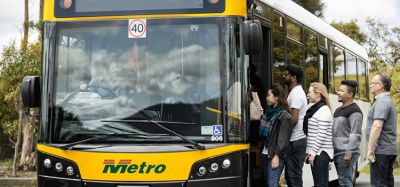The rise and rise of mobile ticketing in public transport
- Like
- Digg
- Del
- Tumblr
- VKontakte
- Buffer
- Love This
- Odnoklassniki
- Meneame
- Blogger
- Amazon
- Yahoo Mail
- Gmail
- AOL
- Newsvine
- HackerNews
- Evernote
- MySpace
- Mail.ru
- Viadeo
- Line
- Comments
- Yummly
- SMS
- Viber
- Telegram
- Subscribe
- Skype
- Facebook Messenger
- Kakao
- LiveJournal
- Yammer
- Edgar
- Fintel
- Mix
- Instapaper
- Copy Link
Posted: 28 November 2019 | Ashley Murdoch - Corethree | No comments yet
Speaking to Intelligent Transport at 2019’s Intelligent Transport Conference, Ashley Murdoch, CEO at Corethree, explains how collaboration fosters the spirit of innovation in public transport, how mobile proved itself as the ticket of choice for consumers, and what comes next in connecting people with places.


Corethree has now managed to land 120 million mobile ticket sales; how did you reach this point?
We reached 100 million at the start of the summer, meaning we’ve wrapped up 20 million since then, which is brilliant. We got there through a combination of the technology doing what it’s supposed to do, but also by working with our clients in a partnership format. Credit really goes to the organisations using our systems – the likes of TfGM, First Bus, Arriva and Lothian Buses. These companies have been using our system for a while now and they’ve all embraced it. A lot of the success to reach that number is because their teams have been architects in driving forward that part of their business. We’ve worked with TfL on various projects as well, introducing elements of gamification, which we’re interested in doing with others as well.
For Corethree, we enjoy working with these types of companies, acting as partners rather than just suppliers. We like to build up a relationship with them so that if they succeed, so do we, and if they don’t, we can get together and work out how to improve things. We like to listen, see where we can help and develop, and look at what new features or new applications need to be put in place.
The industry is trending towards collaboration, whether it’s between public and private companies or otherwise. I’ve always been a believer in strategic alliances, in focusing on what you’re good at and working with others that are brilliant at what they do as well. As an example, we recently began a pilot with First Bus, ITSO, Ticketer and Google, to put host card emulation on phones – effectively a smartcard on a phone. It’s been a great success so far because we’ve been working closely with all partners to deliver it. It’s also a very clever piece of technology that relies on our data platform, Core Engine, as the m-ticket sales do. A smartcard on a phone is a real step forward on that side of things, but again needs the expertise of a number of participants that are working together for the greater good.
The industry is trending towards collaboration, whether it’s between public and private companies or otherwise”
We’re really keen to work with other brands on things like that as well. There’s a lot of technology behind Corethree that we’re looking to mobilise and use in varying solutions with different companies. We’re developing complete end-to-end solutions, but we don’t want to pigeonhole ourselves. As seen from the recent host card emulation collaboration, there’s a big opportunity for us to use certain aspects of our technology to deliver solutions as part of a greater set of companies.
Ultimately, that type of collaboration benefits the end user – the passenger. Is that front of mind in the development stage?
Absolutely, the whole point is to help the user in their journey. We’ve always tried to think of it from a functionality perspective more than anything else. I think that was emphasised when we first started working with David Lynch (CTO at FirstGroup) when he worked at Go Ahead. Our first thoughts were that, whatever we’re working on, it must perform its function first. You can dress it up however you like, but from our perspective as a technology company, the solution must function correctly – it has to allow customers to select, purchase, fulfil and use mobile tickets on their phone.
You can dress it up however you like, but from our perspective as a technology company, the solution must function correctly”
From then on, we’ve always thought about how our work is going to improve the experience for our partners’ customers – the end users. There’s a lot of responsibility to ensure we get it right. Taking that care and being diligent ensures that we’re making a product that’s going to get more traction, that will be easier to use and will help improve boarding times. The operators win, their customers win and hopefully the technology companies behind it win as well.
When you get it right, it’s quite humbling – 120 million of anything is a big number. It’s great for the teams working behind the scenes to see that their work is really making an impact. We’re not just building a faceless box that sits in a server room; we’re developing something with people’s real lives in mind, people who need to get up in the morning and go to work, and then take their kids out at the weekend. Being able to have an impact on people’s day-to-day lives and achieving those sorts of numbers is very rewarding.
The Intelligent Transport Conference will be returning in 2020. Click here to register your interest and receive the latest information!
In terms of working with operators, are there any regular challenges or queries that you come up against regarding the adoption of this type of technology?
Five or six years ago, people were questioning whether mobile was the way to go, but I think those concerns have long since been laid to rest. It’s clear that mobile is the platform to use – there is very little, if any, objection to using smartphones to produce ticketing.
The next challenges are going to be around how to stay customer centric when MaaS expands user choice, while at the same time maintaining intuitive functionality that simply works. The fact that we’ve turned a phone into a contactless device for transport shows that we’re trying to create a leaner, more frictionless experience for everybody. First Bus did a test where they proved that onboarding people using mobile ticketing over any other method significantly decreases the boarding time. Not only is that better for passengers, it also results in literally thousands of pounds in savings on diesel because the vehicle isn’t stationary waiting for people to board.
The mobile has proven itself to be the consumers’ choice. The ability to have that communication at pretty much any time between the operator and their customer through a device that the customer owns is incredibly powerful.
What do you think of the current state of play in the market for other ticketing media, like smartcards?
I think they can coexist; smartcards have their place and EMV definitely has its place, but mobile offers a different perspective on it, mainly because it allows operators to gather more data. With mobile, operators can understand their customers better, communicate more effectively, and make changes very quickly. They might be different, but many of our customers have successful smartcard schemes whilst continuing to have very strong growth in mobile.
It comes down to listening to what people want, which is ultimately a more seamless experience. As part of this, we are looking to take our mobile ticketing technology into the events sector for things like sporting events and concerts. That’s something that we can also bring back to our transport clients as well, though. If someone has a ticket to go to an event at a major arena, there’s probably transport involved to get them there, so why not look to try and connect them?
It comes down to listening to what people want, which is ultimately a more seamless experience”
It’s no longer just a case of going from A to B, but looking at what comes before A and after B. Let’s start working with the user before they get on transport and stay with them once they get off. We’re really excited to see how far we can go in in terms of engaging with the customer.
Biography
Ashley Murdoch is the Founder and CEO of Corethree. He has extensive experience in technology sales & marketing and drives the business opportunity created from the integration of mobile and data. Before founding Corethree, he spent four years as European Marketing Manager at Sony Professional Europe and was later head-hunted to become Fortune Brands’ European General Manager for Digital, developing and launching digital technology solutions into Europe.







